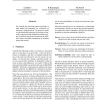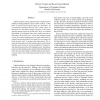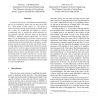948 search results - page 22 / 190 » What can we achieve by arbitrary announcements |
TARK
2007
Springer
14 years 1 months ago
2007
Springer
We contend that reasoning about knowledge is both natural and pragmatic for verification of electronic voting protocols. We present a model in which desirable properties of elect...
NIPS
1998
13 years 9 months ago
1998
In this paper, we address two issues of long-standing interest in the reinforcement learning literature. First, what kinds of performance guarantees can be made for Q-learning aft...
CCS
2006
ACM
13 years 11 months ago
2006
ACM
In-network aggregation is an essential primitive for performing queries on sensor network data. However, most aggregation algorithms assume that all intermediate nodes are trusted...
ICDCS
2002
IEEE
14 years 15 days ago
2002
IEEE
Digital archives protect important data collections from failures by making multiple copies at other archives, so that there are always several good copies of a collection. In a c...
ICNP
2005
IEEE
14 years 1 months ago
2005
IEEE
In wireless networks, it is well understood what throughput can be achieved by nodes who can hear each other (i.e. nodes within a single cell)[1, 3]. The effects of nodes beyond t...



